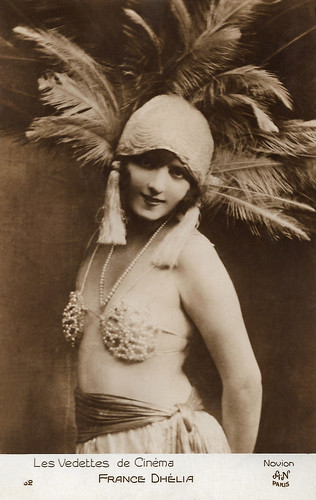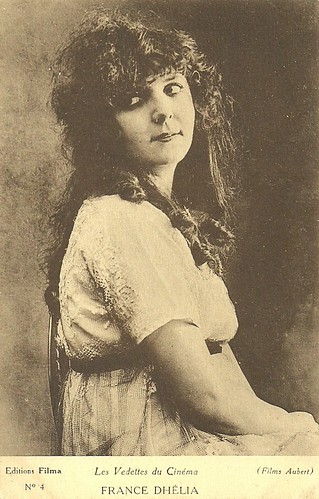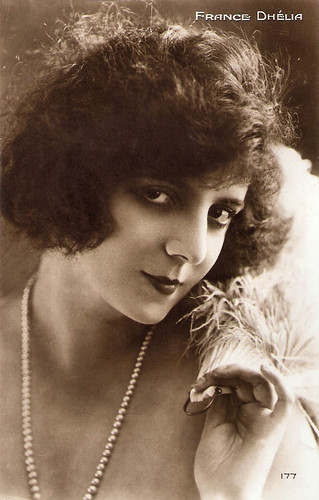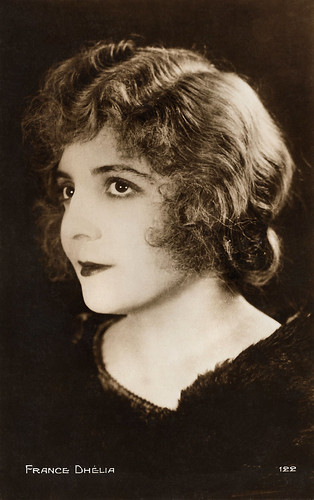Among the 200 feature films and shorts from international archives presented at le Giornate del Cinema Muto, there are always three special events with an orchestra. Between the opening and closing film, there's also the mid-week screening. Tonight the French film La sultane de l'amour/The Sultaness of Love (Charles Burguet, René Le Somptier, 1919) will be presented at the Teatro Verdi. It is the exotic tale of the tormented loves of Princess Daoulah and Prince Mourad, who had met, she disguised as a girl of the people, he as a poor fisherman, and who could not find each other. France Dhélia (1894-1964) plays the title figure, Princess Daoulah. The French actress performed in many silent films by Gaston Roudès. One of her other well-known roles was the Queen of Sheba in the biblical film Le berceau de dieu/The Cradle of God (1926).

French postcard in the Les Vedettes de Cinéma series by A.N., Paris, no. 62. Photo: Novion.

French postcard. Collection: Didier Hanson.
The sultaness of love
France Dhélia was born Franceline Benoit in 1894, in a village near Blois, thus raised in the area of the famous French royal castles along the Loire River.
She made her film début under the name of Mado Floréal in L’Ambitieuse (Camille de Morlhon, 1912) with Gabriel Signoret. Afterwards, she played in various comedies with the character Fred, directed by René Hervil, who also played Fred himself.
During the First World War, she took the name of France Dhélia. She made her first film with director René Le Somptier and appeared in her first feature-length film: L’instinct est maitre/The Instinct is the Ruler (Jacques Feyder, 1917).
She rose to stardom when she played Sultane Daoulah in La sultane d’amour/The Sultaness of Love (René Le Somptier, Charles Burguet, 1918). It was the first film shot at the new Victorine studios in Nice. The film had sets designed by Marco de Gastyne.
This film was followed by Malencontre/Inopportune (Germaine Dulac, 1920), La montée vers l’Acropole/The Climb to the Acropolis (René Le Somptier, 1920), Le coeur magnifique/The Magnificent Heart (Séverin-Mars, Jean Legrand, 1921), La bête traquée/The Trapped Beast (René Le Somptier, Michel Carré, 1922) with Edmond Van Daële, the comedy Petite hôtel à louer/Little Hotel for Rent (Pierre Colombier, 1923) with Gaston Modot, the title role in La garçonne/The Flapper (Armand du Plessy, 1923), and Néné (Jacques de Baroncelli, 1924).

French postcard in the series Les Vedettes du Cinéma by Editions Filma, no. 4. Photo: Films Aubert.
The Queen of Sheba
Between 1923 and 1925, France Dhélia performed in many films by Gaston Roudès, her favourite director.
These films included La guitare et le jazz band/The Guitar and the Jazz band (1923), L’ombre du bonheur (1924) with Constant Rémy, Pulcinella (1925), La maternelle/The Nursery School (1925) with Lucien Dalsace, Le chemin de la gloire/The Road of Glory (1926), Cousine de France/Cousin of France (1927) with Jean-Louis Allibert, and La maison au soleil/House in the Sun (1928).
In those years, Dhélia was often paired with actor Lucien Dalsace, as in La maternelle, Oiseaux de passage and Les petits. Around 1925 she was at the peak of her success. When sound film set in, Dhélia continued to play mostly in films by Roudès, though she did not always play the lead.
An exception was the part of the Queen of Sheba in the biblical film Le berceau de dieu/The Cradle of God (Fred LeRoy Granville, 1926). Other exceptions were the main female character, Blanche, in Jean Epstein’s late silent crime drama Sa tête/Her Head (1929), and a minor part in the early sound film Méphisto (Henri Delbain, Georges Vinter, 1930) opposite a young Jean Gabin.
Her sound films include Le gamin de Paris/Paris Urchin (1932) with Alice Tissot, Roger la Honte (1933) with Constant Rémy, Flofloche (1934), and Le chante de l’amour/The Song of Love (1935). Her last film was Une main a frappé/A Hand Hit (1939). At age 45, France Dhélia quit cinema, and a quarter of a century later she died quietly in Paris in 1964.

French postcard by Cinémagazine-Edition, Paris, no. 177.

French postcard by Cinémagazine, no. 122.
Sources: Caroline Hanotte (CineArtistes), Wikipedia (French) and IMDb.
This post was last updated on 4 January 2024.
No comments:
Post a Comment